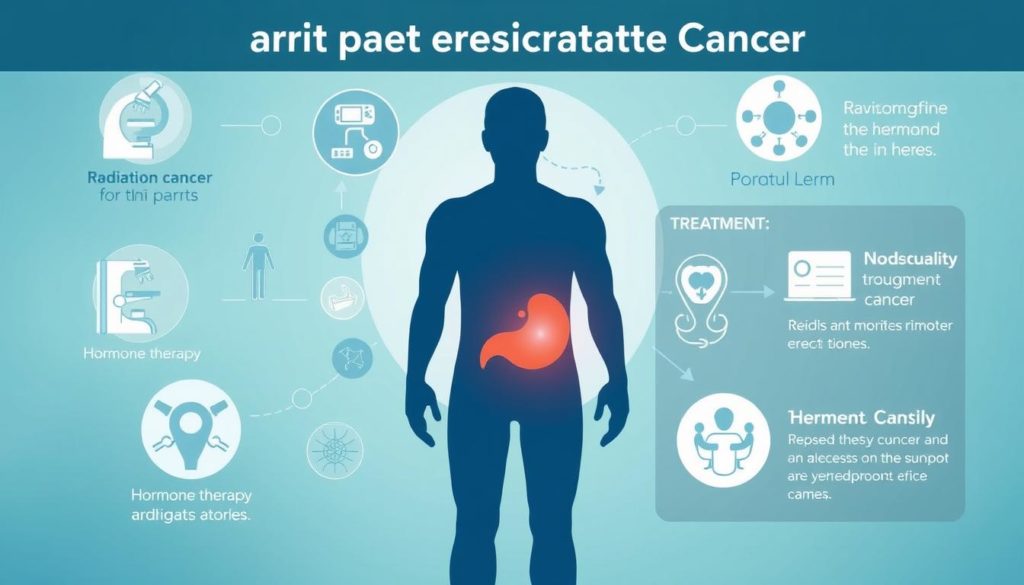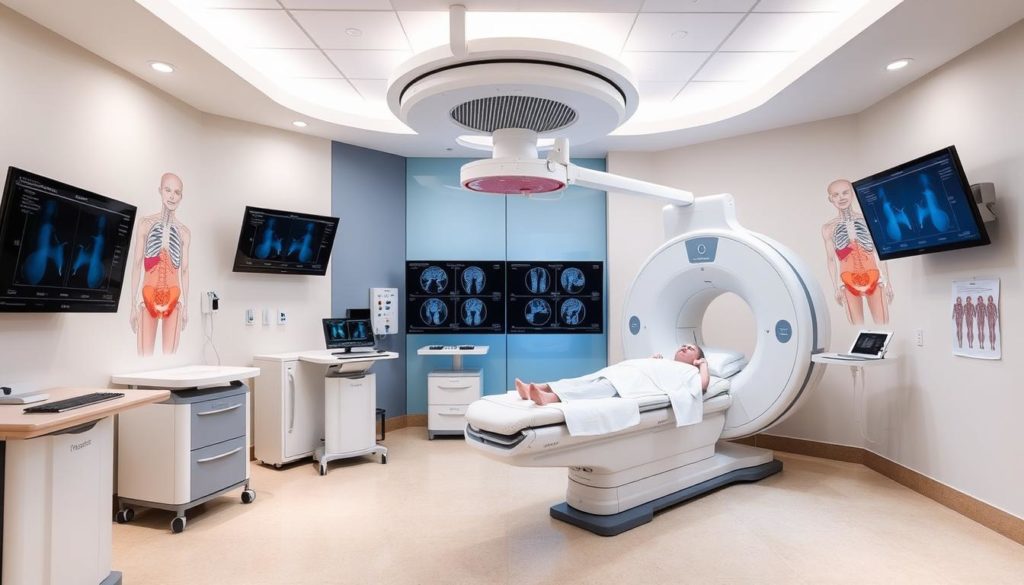When prostate cancer comes back, it can be tough to handle. Patients facing this have different choices to pick from. The choice of treatment for coming back prostate cancer looks at past treatments, where the cancer is, the patient’s health, and what the patient wants.
New breakthrough treatments for coming back prostate cancer are available. These include radiation therapy, hormone therapy, watchful waiting, surgery, chemotherapy, and targeted therapy. They focus on if the cancer has spread to provide the best care possible.
Understanding Recurrent Prostate Cancer
When prostate cancer comes back, it often shows through a quick rise in prostate-specific antigen (PSA) levels. This is known as a biochemical recurrence. It happens without showing other clear signs of the disease. Knowing if the cancer has returned in a specific area or has spread is key. This knowledge helps doctors create the right treatment plan.

Doctors look at many things to make a detailed plan for treatment. They consider how far the cancer has spread and what treatments have been tried before. When dealing with advanced recurrent prostate cancer, a plan that uses many types of treatments works best. This plan combines proven and new methods to improve the patient’s health.
Radiation Therapy for Recurrent Prostate Cancer
Many patients look at radiation therapy for recurrent prostate cancer when cancer comes back after surgery. It helps manage local recurrences and improves outcomes.

External Beam Radiation
Prostate cancer radiation treatment options include external beam radiation therapy (EBRT). EBRT uses high-energy rays aimed at the cancer from outside the body. It’s often paired with hormone therapy for better results.
But, retreating previously treated areas must be done with care. It risks harming nearby organs.
Brachytherapy
Brachytherapy is a key method among prostate cancer radiation treatment options. It places radioactive seeds close to or inside the tumor. It works well for those who had EBRT first and have no spread of cancer.
Brachytherapy targets the cancer closely, reducing risk to healthy tissue.
| Type of Radiation Therapy | Best Used When | Risks |
|---|---|---|
| External Beam Radiation | Post-surgery recurrence, used with hormone therapy | Potential organ damage if retreating previously radiated areas |
| Brachytherapy | Initial treatment was external radiation, no metastasis | Localized side effects due to radiation exposure |
Hormone Therapy: A Common Approach
Hormone therapy is key in treating recurrent prostate cancer. It aims to block hormones that cause cancer to grow. Doctors often use it after surgery or radiation. It is vital for treating cancer that has spread from the prostate.
Androgen Deprivation Therapy (ADT)
ADT targets recurrent prostate cancer by lowering androgen levels or blocking their effects on cancer cells. It plays a major role in slowing down the disease. ADT may use surgery like orchiectomy, or drugs like LHRH agonists and antagonists, to reduce testosterone.
Newer Hormone Drugs
Recent advances in prostate cancer treatment include new hormone drugs. Agents like Abiraterone and Enzalutamide focus on particular pathways. They are more effective in controlling advanced cancers by blocking androgen receptors or stopping androgen production. This has led to better results for patients.
Let’s compare traditional ADT with new hormone drugs:
| Treatment Type | Mechanism | Examples | Use Case |
|---|---|---|---|
| ADT | Reduction of androgen levels | LHRH agonists, Orchiectomy | Post-surgery, cancers outside prostate |
| Newer Hormone Drugs | Interference with androgen receptor signaling, androgen synthesis inhibition | Abiraterone, Enzalutamide | Advanced, resistant prostate cancer |
Latest Advancements in Prostate Cancer Treatment
The world of prostate cancer treatment has changed a lot recently. We now have new treatments for fighting cancer that comes back. Top recent breakthroughs include a prostate cancer vaccine and fresh hormone therapies.
Prostate Cancer Vaccine
A big step forward is the prostate cancer vaccine. It’s designed to train the immune system to fight prostate cancer cells. It’s different from old methods because it boosts your body’s natural defenses. This means it could lead to fewer bad reactions and help results last longer.
Innovative Hormone Therapies
New hormone treatments for prostate cancer are also changing things. They stop cancer cells by blocking the hormones these cells need to grow. Companies like Astellas Pharma and Janssen Pharmaceuticals are leading this charge. Their work is offering new ways to slow cancer growth and helps patients stay in remission longer.
| Treatment | Prominent Feature | Benefit |
|---|---|---|
| Prostate Cancer Vaccine | Stimulates Immune System | Fewer Side Effects |
| Novel Hormone Therapies | Inhibits Cancer-Driven Hormones | Extended Remission |
Thanks to these new methods, patients have better options. This is improving how we tackle recurrent prostate cancer.
Surgical Options for Recurrence
For people with prostate cancer that came back, surgical treatment for recurrent prostate cancer is often picked. This is true especially after first trying radiation therapy. These surgeries aim to take out the cancer that has returned in hopes of curing it.
Radical Prostatectomy
Radical prostatectomy means the prostate gland is totally removed. It’s a major way to fight cancer that has returned. Checking how well radical prostatectomy works is key. It’s often advised for those whose cancer is back but hasn’t spread outside the prostate.
Pelvic Lymph Node Dissection
Pelvic lymph node dissection takes lymph nodes from the pelvis area. It usually goes with a radical prostatectomy. This operation helps figure out how far the cancer has spread. It can lead to better chances of treating it well.
Chemotherapy for Recurrent Prostate Cancer
Chemotherapy is a key treatment for patients with prostate cancer that has spread. It’s especially useful when the cancer grows despite other treatments.
When to Consider Chemotherapy
Choosing chemotherapy involves looking at several clinical factors. It’s often advised when PSA levels jump quickly or if the cancer is very aggressive. These factors play a big role in how well chemotherapy works.
Common Chemotherapy Drugs
There are a few chemotherapy drugs often used for recurring prostate cancer. Docetaxel and prednisone are common choices. They are usually given with hormone therapy to improve results.
| Drug | Function | Combination Therapy |
|---|---|---|
| Docetaxel | Prevents cancer cell growth | Often used with hormone therapy |
| Prednisone | Reduces inflammation and boosts other treatments’ effects | Combined with Docetaxel for better outcomes |
Finding the best drug mix is key to getting the most from treatment and keeping side effects low. With careful monitoring, chemotherapy can greatly help patients with recurring prostate cancer.
Targeted Therapies for Advanced Cases
Advanced prostate cancer treatment has changed a lot recently. Targeted therapies are now a key option. They are especially useful for patients with certain genetic markers or those who do not react to hormone therapy.
PARP Inhibitors
PARP inhibitors are at the forefront of these advances. Drugs like olaparib target BRCA mutations in cancer cells. By targeting these mutations, PARP inhibitors stop cancer cells from repairing themselves. This leads to their death and is effective in treating recurrent prostate cancer.
Hormone-Refractory Prostate Cancer Options
There are new options for prostate cancer that doesn’t respond to hormone treatment. These new therapies are powerful. They provide options that can slow cancer growth when hormone treatments don’t work. This highlights the importance of personalized and advanced treatment strategies in today’s fight against prostate cancer.
| Therapy Type | Target | Benefits |
|---|---|---|
| PARP Inhibitors | BRCA Mutations | Effectively targets and kills cancer cells with specific genetic vulnerabilities. |
| Hormone-Refractory Options | Advanced Prostate Cancer | Offers alternatives when traditional hormone therapies are ineffective. |
Innovative Therapies for Recurrent Prostate Cancer
For those looking for new treatments, several innovative methods show promise against recurrent prostate cancer. High-Intensity Focused Ultrasound (HIFU) and cryotherapy are notable. They are effective in targeting and destroying cancer cells without invasive surgery.
High-Intensity Focused Ultrasound (HIFU)
HIFU uses focused ultrasound waves to zap cancer cells. This method is less invasive than traditional treatments. It causes less pain and has a quicker recovery time. HIFU spares healthy tissue around the cancer, making it a safer choice for those who qualify.
Cryotherapy
Cryotherapy uses extreme cold to destroy cancerous tissue. It’s effective because it freezes and kills cancer cells while sparing healthy areas. This option offers hope to patients whose cancer has come back. Both HIFU and cryotherapy are significant advancements, offering new paths for treatment.
FAQ
What are the effective treatments for recurrent prostate cancer?
Treatment options for recurrent prostate cancer include many choices. These are radiation therapy, hormone therapy, and surgery. Others are chemotherapy, targeted therapy, and innovations like cryotherapy and High-Intensity Focused Ultrasound (HIFU). The best treatment depends on several factors. These include previous treatments, where the cancer is, and what the patient wants and how healthy they are.
How is recurrent prostate cancer detected?
Doctors often find recurrent prostate cancer through a rise in PSA levels. This indicates a biochemical recurrence. It might also be seen through imaging or other diagnostic methods as evident disease spread.
What does biochemical recurrence mean?
Biochemical recurrence happens when PSA levels go up after the first treatment for prostate cancer. This means that some cancer cells may still be there and active, even without visible signs of the disease.
What are the radiation therapy options for recurrent prostate cancer?
Radiation therapy for recurrent prostate cancer comes in different types. External Beam Radiation targets the cancer from outside the body. Brachytherapy involves putting radioactive materials right into or near the tumor.
How does Androgen Deprivation Therapy (ADT) help in treating recurrent prostate cancer?
ADT lowers the male hormones that make prostate cancer cells grow. It’s often used after surgery or radiation. It is also for cancers that have spread beyond the prostate.
What are the newer hormone drugs available for advanced prostate cancer?
New hormone drugs include LHRH antagonists, LHRH agonists, and androgen synthesis inhibitors. They target specific pathways. This helps stop the growth of advanced prostate cancer cells.
What is the prostate cancer vaccine, and how does it work?
The prostate cancer vaccine helps the immune system fight prostate cancer cells. It aims to create a strong and targeted response against the cancer.
What are the surgical options for treating recurrent prostate cancer?
Surgical options include Radical Prostatectomy, removing the prostate gland, and Pelvic Lymph Node Dissection, removing lymph nodes in the pelvis. These options depend on how much the cancer has come back and the chance of curing it.
When should chemotherapy be considered for recurrent prostate cancer?
Chemotherapy is considered when the cancer spreads beyond the prostate. It’s also for cancers not responding to other treatments like hormone therapy. It depends on how fast PSA levels are rising and how aggressive the cancer is.
What are common chemotherapy drugs used for recurrent prostate cancer?
Common chemotherapy drugs are docetaxel and prednisone. They’re often used with hormone therapy. This combination helps improve outcomes in advanced prostate cancer cases.
How do PARP inhibitors work in treating advanced prostate cancer?
PARP inhibitors like olaparib target certain genetic mutations in cancer cells. They offer a tailored treatment approach, especially for cancers that don’t respond to traditional hormone therapies.
What are the innovative therapies for treating recurrent prostate cancer?
Innovative therapies include High-Intensity Focused Ultrasound (HIFU) and cryotherapy. HIFU uses ultrasound waves to kill cancer cells. Cryotherapy uses extreme cold to get rid of abnormal tissue.


